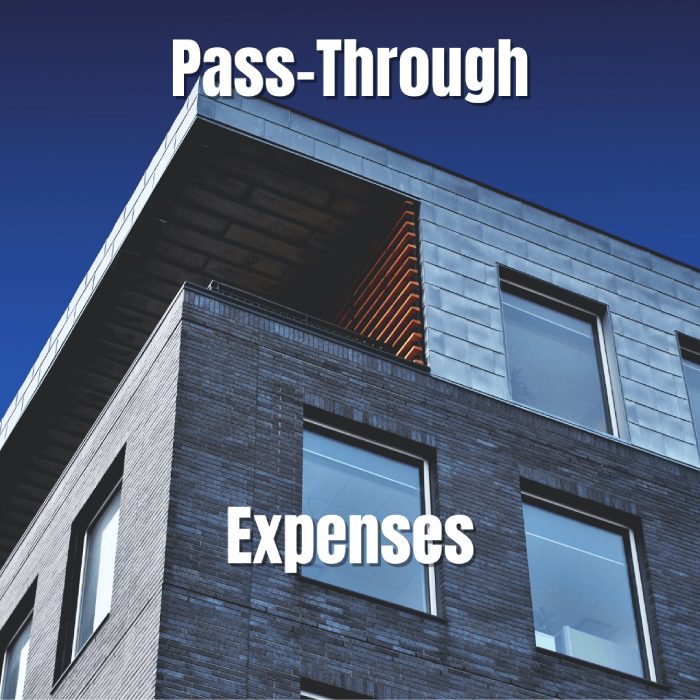Pass-through expenses are one of many commercial real estate concepts that any professional in this industry should understand.
Real estate owners need to identify and offset pass-through expenses to maintain healthy margins and keep operating costs as low as possible.
Commercial space renters need to understand which costs they will be responsible for before signing a lease agreement.
What Is A Pass-Through Expense?
A pass-through expense is a property cost that the landlord passes through to those who are renting space in their commercial real estate building. These expenses are separate from the rent and typically include:
- Common Area Maintenance or CAM Expenses
- Insurance
- Utilities
- Property Taxes
- Janitorial Expenses
- Other Miscellaneous Costs
Landlords often roll these pass-through expenses into the monthly rent, so renters only make one payment each month. However, a renter needs to understand the splits to calculate how much of their rent pays for the space and how much covers pass-through expenses. This is important because pass-through expenses can sometimes increase over time, and a renter needs to know when those increases are coming so they can budget accordingly.
Do Pass-Through Expenses Increase?
Typically, in commercial real estate, pass-through expenses increase year over year. This increase results from CAM expenses and other additional expenses that tend to grow each year.
As the overhead costs of any commercial real estate property are likely to rise each year, you can expect every tenant to experience a similar increase in their rent, as well.
How Are Pass-Through Expenses Calculated?
Don’t be surprised if you find out that you are paying more rent in the form of pass-through expenses than some of the other tenants within your shared commercial real estate property.
Pass-through expenses in the form of CAM expenses, utilities, insurances, and other fees can vary significantly even among tenants renting space in the same building.
So, as a renter, how can you calculate these expenses, and how can you tell if the agreement is fair?
Pass-through expenses are typically calculated based on the square footage of the space you are renting. Each of the pass-through expenses listed above contributes its own portion to the overall costs.
Essentially, your landlord will determine his overall operating costs and divide them between tenants based on a formula that divides a renter’s square footage in their rental space by the overall square footage of the commercial real estate property.
This also means that landlords must cover the pass-through expenses of any vacant space in the building, so make sure you are not paying for any pass-through expenses for vacant units.
Understanding The Structure Of Your Lease
To understand more about which expenses will pass through to a tenant, it is essential to review the lease terms carefully before signing and understand the commercial lease structure.
Leases can fall under three possible categories: triple net, modified gross, or full-service leases, also referred to as gross leases.
In a triple net lease, all expenses, including CAM expenses, property taxes, utilities, insurances, and other applicable expenses, are passed through to the tenant. Tenants with this lease agreement will often receive bills for their utilities and will need to start paying these expenses as soon as their lease starts.
Modified gross and full-service leases usually estimate and include insurances, CAM expenses, utilities, and other expenses in the rental rate. In these kinds of agreements, tenants are typically not billed for any additional expenses that exceed the amount of their base year (or first-year) rent. However, during the second year of their lease, as pass-through expenses fluctuate, it is common for tenants to cover the additional costs.
Can You Negotiate Pass-Through Expenses?
As with any lease, it never hurts to try and negotiate for the best possible terms. This doesn’t mean that a landlord is always willing to negotiate, but it typically doesn’t hurt to try. Consider asking if there are other interested renters before you try to be too aggressive with your negotiations because you don’t want another tenant to get the spot because they were willing to take the landlord’s terms.
Before entering a potential lease agreement, soon-to-be tenants can ask for certain limitations or built-in safety parameters to keep their expenses at a reasonable amount.
By ensuring that your pass-through expenses do not increase beyond a certain amount, business owners and tenants can better build their budget and estimate their overall profit. Even if your potential landlord isn’t willing to negotiate pass-through expenses terms, it is essential to read through all of the terms of your agreement carefully. You need to ensure that you fully understand how your pass-through expenses will affect your rent.






